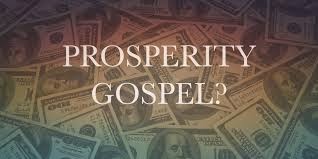Prosperity Gospel:
If you watch a preacher on television, you have probably been exposed to the Prosperity Gospel or Prosperity Theology. These preachers may be very personable and preach a positive message full of hope. They may put on a program with high production values and help us feel good. But, is it really Christianity?
Prosperity theology is a Christian religious doctrine that financial blessing is the will of God for Christians, and that faith, positive speech, and donations to Christian ministries will increase one's wealth. Most churches in the prosperity movement are non-denominational and independent, though some have formed networks. It is common for the pastor to be the highest organizational authority figure.
Founders of the movement include Kenneth Hagin, Kenneth Copeland, and Frederick K.C. Price. The movement began to take hold in the 1970's and 1980's. Today it is pretty mainstream. Joel Osteen at Lakewood Church in Houston, Texas has a ministry that reaches 7 million viewers.
Prosperity theology is based on non-traditional interpretations of the Bible, often with an emphasis on the Book of Malachi. The doctrine views the Bible as a contract between God and humans. If humans will have faith in God, He will deliver His promises of security and prosperity. The doctrine emphasizes the importance of personal empowerment, proposing that it is God's will for His people to be happy. Another key prosperity teaching is the "Positive Confession" or "Word of Faith", that teaches that a Christian with faith can speak into existence anything consistent with the will of God.
Mainstream evangelicalism has consistently opposed prosperity theology as heresy. Prosperity ministries have often come into conflict with the Pentecostal and Charismatic movements. Critics have argued that prosperity theology has little in common with traditional Christian theology.
In the gospel of St. Matthew Jesus tells us, "You cannot serve both God and money," and "It is easier for a camel to pass through the eye of a needle, than for a rich man to enter into the kingdom of God."
Jesus was born poor and He died poor. During His earthly tenure He spoke time and time again about the importance of spiritual wealth and health. When He talked about material wealth, it was usually a cautionary tale.
The Bible is full of good advice, that if followed will help you be successful. That's not the point, though. Jesus came to show us how to live a good life, not to get rich and happy. Jesus by His death and Resurrection forgives our sins and conquers death that we may live forever with Him.
Think about it!
God love you!
